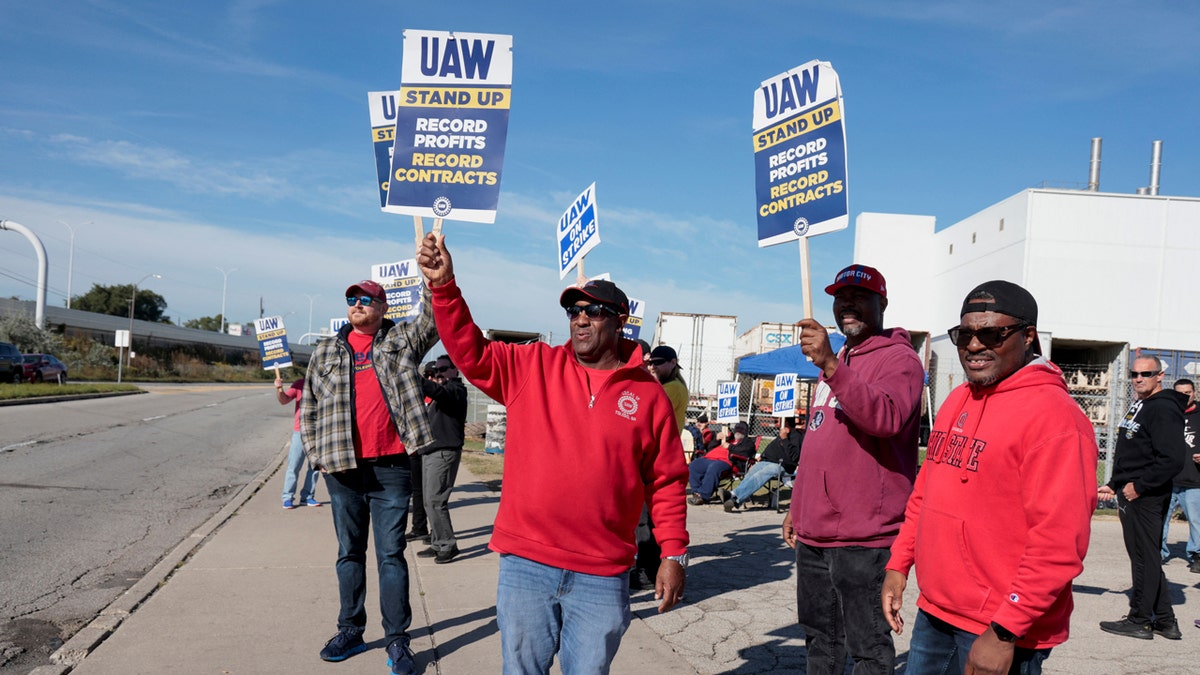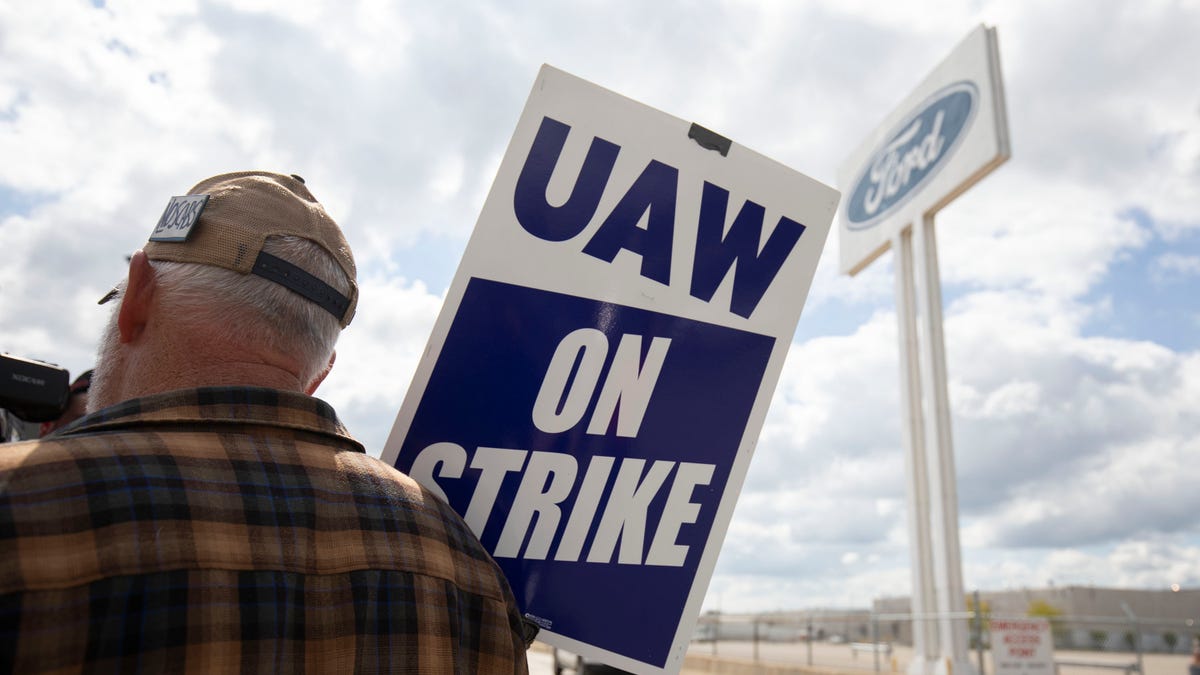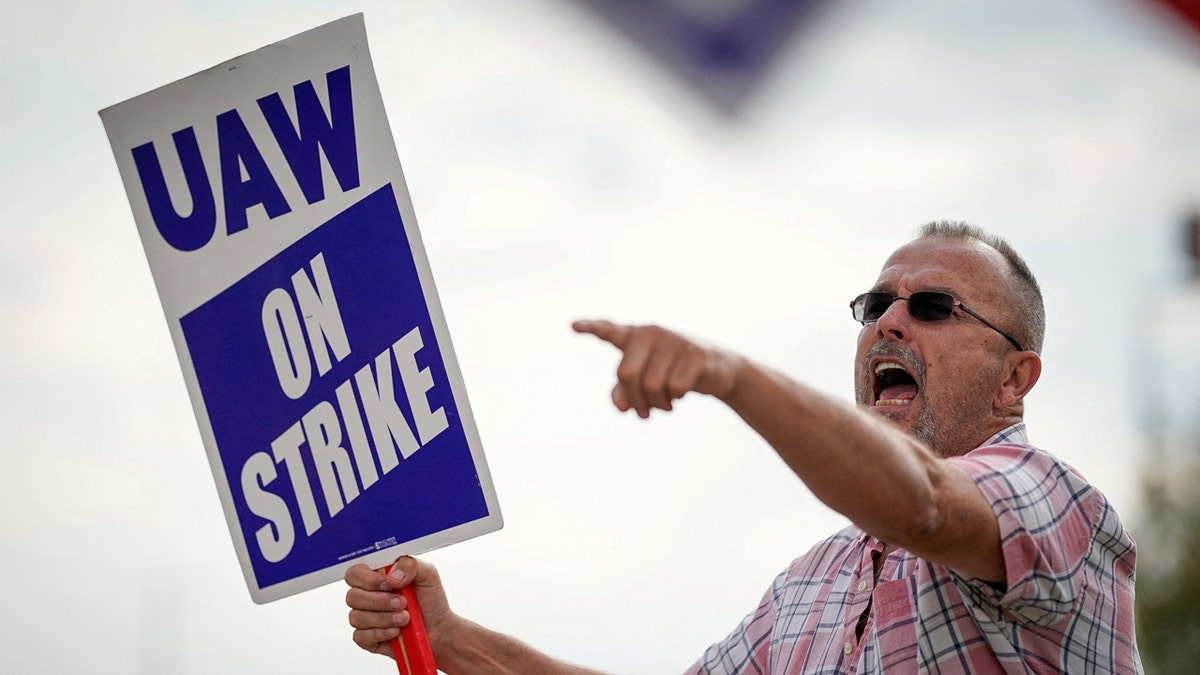UAW workers reeling as strike against 'Big 3' automakers reaches third day: 'All of us are suffering'
UAW worker Jennifer Devers discusses the ongoing strike against GM, Ford and Stellantis, the impact of electric vehicles and Biden's self-described role as a pro-union president.
I strongly support the UAW strike against the Big Three automakers (General Motors, Ford and Stellantis). Here’s why.
The fight the UAW is waging has everything to do with the outrageous level of corporate greed and arrogance on the part of senior executives in the auto industry and their masters on Wall Street.
This is an industry that had to be bailed out by U.S. taxpayers in 2008. As part of the bailout autoworkers were forced to make painful economic concessions.
STRIKE AT MERCEDES SUPPLIER ZF'S ALABAMA PLANT DEMANDS BETTER PAY AND BENEFITS
Today, however, the Big Three are enjoying record-breaking profits. During the first six months of this year, they have made $21 billion in profits – up 80% from the same time period last year. And, over the past decade, the Big Three have made $250 billion in profits.

Striking United Auto Workers members picket outside the Stellantis Jeep plant, in Toledo, Ohio, on Sept. 19, 2023. (REUTERS/Rebecca Cook)
While the Big Three are enjoying huge profits and providing their CEOs with exorbitant compensation packages, autoworkers continue to fall further and further behind.
Last year, Mary Barra, the CEO of General Motors, received $29 million – 360 times more than the average worker at GM. Over the last nine years, she has made over $200 million in total compensation.
The CEO of Stellantis, Carlos Taveras, made $25 million in total compensation last year – 365 times more than the average worker at this company.
The CEO of Ford, Jim Farley, made $21 million in total compensation last year – 280 times more than the average autoworker at Ford.
Meanwhile, the average wage for an autoworker has gone down by 30% over the past 20 years after adjusting for inflation.
While the Big Three could afford to spend $9 billion last year on stock buybacks and dividends, the average starting wage at these companies is just $17 an hour. Unbelievably, workers are leaving the industry to find better paying jobs at McDonald’s.
Recently I was able to meet with some of these autoworkers. Here are just few things they shared with me. I was told that some workers were forced to work for 90 days straight for 12 hours a day. Think about that. 90 days straight – no time off on weekends or special family occasions – for 12 hours a day.
Another worker told me she had worked as a "temp worker" from March 2006 to December 2012 and could not even become eligible for a loan to purchase a car from the very plant she works at. Why? Because as a "temp worker" her job description did not show the longevity needed to qualify for a car loan. This is the absurdity that the UAW is fighting to reverse.

United Auto Workers members strike at the Ford Michigan Assembly Plant on September 15, 2023, in Wayne, Michigan. This is the first time in history that the UAW is striking all three of the Big Three automakers, Ford, General Motors and Stellantis, at the same time. (Bill Pugliano/Getty Images)
What the UAW is fighting for is not radical. It is the totally reasonable demand that autoworkers, who have made enormous financial sacrifices over the past 40 years, finally receive a fair share of the record-breaking profits that their labor has generated.
What does that mean?
It means that if the Big Three can afford to give a 40% pay raise to their CEOs and provide billions of dollars to their stockholders, they can afford to provide similar pay raises and cost of living adjustments for the workers who make their products.
And let’s be clear. While decent wages are a key demand for the UAW, there are other important contract changes that the union has proposed.
The union, quite appropriately, wants to get rid of the two-tier system under which newer workers earn lower wages and receive less generous benefits than others doing the same exact work. They also want to end the use of "temporary workers" who are ruthlessly exploited and treated like second-class citizens after working for these companies year after year after year.
At a time when half of older Americans have no retirement savings and no idea how they will ever be able to retire with any shred of dignity, the UAW is demanding the restoration of pensions and retiree health benefits that were taken away from new hires during the Wall Street crash of 2008.
The UAW wants to make sure that autoworkers have the right to strike when the Big Three announces that they will be shutting down another plant. Over the past 20 years, the Big Three have shut down 65 factories and shipped tens of thousands of jobs to Mexico and other low wage countries where they can pay workers starvation wages with no benefits in a destructive race to the bottom.
The union also wants to make sure that as the industry proposes to build 10 new Electric Vehicle battery plants that the workers in these plants become part of the UAW and receive the same wages and benefits as union members.
While the Big Three could afford to spend $9 billion last year on stock buybacks and dividends, the average starting wage at these companies is just $17 an hour. Unbelievably, workers are leaving the industry to find better paying jobs at McDonald’s.
As we transition away from fossil fuels and move toward electric vehicles in the fight to combat climate change the UAW wants to make sure that the green jobs of the future are good-paying, union jobs.
Now, I understand that many pundits in the corporate media have been telling the American people how bad a strike will be for the economy and how many billions of dollars the auto industry may lose as a result.
Let me offer a different perspective.
In my view, when you have autoworkers who cannot afford to buy the cars they make on the assembly line, that is bad for the economy.

The UAW is on strike against the auto companies once more. FILE: A General Motors assembly worker pickets outside the General Motors Bowling Green plant during the United Auto Workers national strike in Bowling Green, Kentucky, on Oct. 10, 2019. (REUTERS/Bryan Woolston)
When you have autoworkers who cannot afford to take out a mortgage to buy a modest home while the companies they work for make record-breaking profits, that is bad for the economy.
When you have autoworkers who can’t afford childcare or to send their kids to college, that is bad for the economy.
That is why the UAW is on strike.
Let’s be clear. What’s going on in the auto industry is not unique. It’s pretty much what’s been happening all over the American economy.
In the United States today, at a time of massive income and wealth inequality, weekly wages for the average American worker are actually $50 a week lower than they were 50 years ago after adjusting for inflation.
In other words, despite a massive increase in worker productivity in the automobile industry and every other sector of our economy; despite CEOs now making 400 times more than what their employees earn; despite record-breaking corporate profits; despite corporate America spending hundreds of billions on stock buybacks and dividends, the average American worker is worse off today than he or she was 50 years ago.
In America today, over 60% of workers are living paycheck to paycheck. They are living under incredible stress as they worry about how they are going to pay for rent, healthcare, childcare and other basic necessities. Families in the automobile industry and every other industry in America, should not have to live with that kind of stress.
CLICK HERE FOR MORE FOX NEWS OPINION
What the UAW understands, and all of us should remember, is that over the last 50 years there has been a massive redistribution of wealth in America. Unfortunately, it has gone in exactly the wrong direction. Since 1975, over $50 trillion in wealth has been redistributed from the bottom 90% to the top 1% – primarily because a growing percentage of corporate profits have been flowing into the stock portfolios of the wealthy few.
At a time when half of older Americans have no retirement savings and no idea how they will ever be able to retire with any shred of dignity, the UAW is demanding the restoration of pensions and retiree health benefits that were taken away from new hires during the Wall Street crash of 2008.
In 1937, the UAW played a historic role in American history. The autoworkers of that time had the extraordinary courage to take on the greed and power of the auto industry and formed their union. Their successful sit-down strike in Flint, Michigan, ignited a grassroots movement across the country that helped create an American middle class which became the envy of the world.
Now in the year 2023 – 86 years later – the UAW, once again, is helping to lead the effort to rebuild and grow a middle class that has been beaten down by their corporate bosses for far too long.
CLICK HERE TO GET THE FOX NEWS APP
Their fight against corporate greed is the fight to improve the lives of every worker in America.
As the Chairman of the Health, Education, Labor and Pensions Committee, I am very proud to stand in solidarity with the UAW and I will do everything that I can do to make sure they receive a fair contract.













































